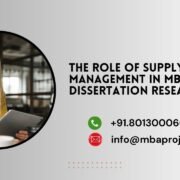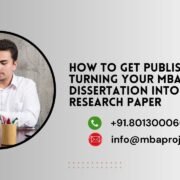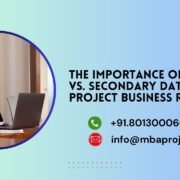What to Review Before Submitting Your MBA Dissertation
Final Checklist: What to Review Before Submitting Your MBA Dissertation
What to Review Before Submitting Your MBA Dissertation. Submitting your MBA dissertation is a crucial milestone in your academic journey. To ensure a high-quality submission, a meticulous final review is essential. This comprehensive checklist will help you verify that every aspect of your dissertation meets academic standards and maximizes your chances of success.
1. Verify Your Dissertation Structure
A well-organized dissertation follows a logical flow. Ensure that your dissertation includes the following sections:
- Title Page: Includes your dissertation title, name, university, department, and submission date.
- Abstract: A concise summary of the research problem, methodology, findings, and conclusion.
- Acknowledgments: A formal appreciation of advisors, peers, or institutions that contributed to your research.
- Table of Contents: Lists all headings and subheadings with corresponding page numbers.
- Introduction: Clearly defines the research problem, objectives, and significance.
- Literature Review: A critical analysis of relevant academic sources, establishing the research gap.
- Methodology: Describes research design, data collection methods, and analytical approach.
- Results & Discussion: Presents findings with supporting evidence and interpretations.
- Conclusion & Recommendations: Summarizes findings, contributions, limitations, and future research directions.
- References/Bibliography: Properly formatted citation list following the required style.
- Appendices: Additional materials such as raw data, surveys, and interview transcripts.
2. Check Formatting and Styling
Every MBA program has specific formatting guidelines. Ensure:
- Font & Size: Consistently use the prescribed font (e.g., Times New Roman, 12pt).
- Margins & Spacing: Standard margins (1 inch) and double-spaced text.
- Page Numbers: Numbered pages in the correct format.
- Headings & Subheadings: Proper use of heading levels for easy navigation.
- Consistent Citation Style: Follow APA, MLA, Harvard, or any required citation format consistently.
3. Proofread for Grammar, Spelling, and Clarity
Errors in grammar and spelling can undermine the credibility of your research. To ensure clarity:
- Use Spell Check & Grammar Tools: Grammarly, Hemingway Editor, or built-in proofreading tools.
- Read Aloud: Helps in identifying awkward phrasing.
- Check Sentence Structure: Avoid overly complex or ambiguous sentences.
- Eliminate Redundancy: Remove repetitive content.
- Maintain Academic Tone: Formal, precise, and objective language.
4. Validate Data and References
Your research should be credible and well-supported by accurate data and properly cited sources:
- Check Data Consistency: Ensure tables, graphs, and charts align with your narrative.
- Validate Citations: Cross-check references with your bibliography.
- Verify Data Sources: Ensure all sources are reputable and up to date.
- Check for Plagiarism: Use Turnitin, Copyscape, or other plagiarism detection tools.
5. Ensure Logical Flow and Cohesion
Your dissertation should read smoothly from start to finish:
- Strong Introduction & Conclusion: The introduction sets up the study, while the conclusion reinforces key findings.
- Smooth Transitions: Logical progression between sections and paragraphs.
- Avoid Jargon: Ensure accessibility to readers unfamiliar with technical terms.
- Consistent Terminology: Use key terms uniformly throughout the dissertation.
6. Review Figures, Tables, and Appendices
Visual aids must be clear, correctly labeled, and referenced in the text:
- Tables & Figures: Ensure proper numbering and titles.
- Legibility: Text in images or graphs should be clear.
- Correct Placement: Position close to the relevant discussion in the text.
- Appendices Completeness: Include all supplementary materials.
7. Confirm Compliance with University Guidelines
Each institution has unique requirements. Before submission:
- Check Submission Guidelines: Review the university’s official dissertation manual.
- File Format: Submit in the required format (PDF, Word, or printed copies).
- Submission Deadline: Ensure on-time submission to avoid penalties.
- Final Approval: If required, get approval from your supervisor or department.
8. Conduct a Final Review
Before submission:
- Print a Hard Copy: Reviewing on paper often reveals overlooked mistakes.
- Seek Peer Review: Ask classmates or colleagues for feedback.
- Review One Section at a Time: Helps maintain focus and accuracy.
- Take a Break: Revisit with fresh eyes for a final polish.
By following this final checklist, you can submit a high-quality MBA dissertation with confidence. Proper attention to detail ensures a professional, well-structured, and academically rigorous submission that enhances your chances of success.
Thank you for reading our Blog “Final Checklist: What to Review Before Submitting Your MBA Dissertation”.
Also, read our more BLOG here.
For Order “MBA Projects” feel free to contact us at Mob: Call / WhatsApp: +91.8013000664 || Email: info@mbaprojects.net.in














